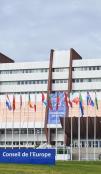EEAS organises 'Resilience and Memory: Srebrenica 30 Years Later' event in Brussels
On July 1 the European External Action Service organised a commemorative event "Resilience and Memory: Srebrenica 30 Years Later" at BOZAR in Brussels, bringing together diplomats, civil society leaders, journalists and academics to honour the victims of the Srebrenica Genocide and reflect on the role of culture, memory, and justice in post-conflict recovery.
The event featured the documentary screening of "Samir Mehić Bowie – Letters from Srebrenica", which tells the story of a young rock guitarist whose passion for music represented hope and resistance in the darkest of times. Through Samir's story, audiences glimpsed the human spirit's capacity for creativity and connection even in the face of unimaginable tragedy.
Following the screening, a roundtable discussion explored key themes raised in the film. The panel included Amina Sejfić from the Post-Conflict Research Centre, journalist and director of the documentary Lamija Grebo from the Balkan Investigative Reporting Network, and Rada Pejić-Sremac, Coordinator of the Mechanism Information Programme for Affected Communities.
The discussion focused on the intergenerational legacy of the genocide, the lived experiences of second-generation survivors, and the challenges of rebuilding trust between communities in Srebrenica today. Panellists emphasized how music, film, and storytelling can humanise history and counter denial while fostering empathy across groups. The event concluded with a call to sustain education and remembrance efforts to ensure that the lessons of Srebrenica are not forgotten by future generations.
The commemoration formed part of the EEAS's ongoing commitment to supporting transitional justice and remembrance initiatives in the Western Balkans region.
- Follow the link to learn more about the Srebrenica Genocide commemoration at EEAS





